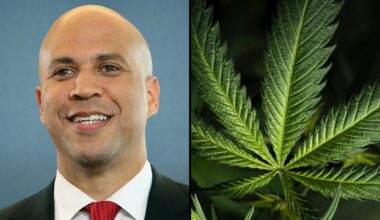A key U.S. senator is conceding that the votes may not be there to pass a wide-ranging legalization bill he’s sponsoring—but like his colleagues, Senate Finance Committee Chairman Ron Wyden (D-OR) says he remains hopeful that Congress will enact “some key reforms” on cannabis this session.
This has become a consistent talking point since Wyden filed the Cannabis Administration and Opportunity Act (CAOA) last month, alongside Senate Majority Leader Chuck Schumer (D-NY) and Sen. Cory Booker (D-NJ).
All three of the prime sponsors have acknowledged in recent weeks that getting the comprehensive legalization bill through the Senate with the required 60 votes is an ambitious, if not impossible, goal.
Wyden hasn’t been quite as vocal as Schumer and Booker about plans to pursue alternative, incremental legislation. But in a statement to The American Prospect that was published on Thursday, the senator tempered expectations about the prospects of CAOA.
“A 50-50 [Democratic] majority in the Senate will make passing our bill a difficult feat, but I hope we can at minimum pass some key reforms this Congress,” he said. “This is a winning issue that is overwhelmingly backed by the American people, especially young voters, who understand how ridiculous and unfair it is for folks to be locked away for something that most states have legalized and almost everyone thinks should be legal.”
He added that the legalization bill “empowers states to set their own laws and it fixes the myriad of issues caused by current prohibition, like banking and research,” which enjoy significant bipartisan support. But CAOA “goes even further by setting up a federal regulatory system to protect public health and safety, all while prioritizing restorative and economic justice to help undo decades of harm.”
(The article where the comments appear is titled “Democrats in Danger of Missing the Marijuana Moment” (emphasis added). But fear not: this was simple coincidence. Nobody, regardless of party, is in danger of missing the cannabis news site Marijuana Moment—especially if they sign up for our daily newsletter.)
In any case, in an ideal world for the senators, they would be able to secure the votes and do what the House has done twice at this point: pass legislation to end federal prohibition. But even getting all 50 Democrats on board with the bold reform is in doubt, to say nothing of the concerted opposition it would likely face from the GOP side of the aisle.
The sponsors recognize that political reality, which is why Schumer has been in talks with bipartisan and bicameral offices about introducing what would effectively be a marijuana omnibus of modest reforms.
The so-called “SAFE Banking Plus” bill, which is still being finalized, is expected to contain provisions to safeguard banks that work with state-legal cannabis businesses, provide pathways for marijuana expungements, promote research into the plant, among other potential proposals. Advocates have also been talking with lawmakers and staff about building on the banking component by incorporating several equity-centric amendments.
Prior to the introduction of CAOA, the Senate trio repeatedly emphasized that they didn’t want to see the standalone Secure and Fair Enforcement (SAFE) Banking Act pass before comprehensive legalization legislation centered in equity enacted.
A majority of Americans support ending federal marijuana prohibition, but the Senate just isn’t there yet. Now the conversation is about finding common ground and identifying components of CAOA and other cannabis reform bills that could be merged into a passable package. It’s not clear what that final package will look like, but Booker said recently that he expects it to be filed sometime between November and January.
The senator also reiterated this month that he feels the standalone SAFE Banking Act “requires changes” if it’s going to advance before cannabis is federally legalized.
Booker initially signaled that he was coming around to marijuana banking reform (contingent on equity provisions) at a Senate Judiciary subcommittee hearing last month that he convened as chairman.
Meanwhile, the bicameral sponsors of the SAFE Banking Act, Reps. Ed Perlmutter (D-CO) and Sen. Jeff Merkley (D-OR), laid out next steps for the cannabis banking reform last month at a briefing organized by the U.S. Cannabis Council (USCC).
Also at that briefing, Rep. Earl Blumenauer (D-OR) said that he recently spoke with Booker about the pathway for marijuana reform this session, and they had a “great conversation” about finding areas of compromise.
“I think the senator is fully aware of the consequences of this failed policy of prohibition in terms of what it does with the SAFE Banking Act and the threat that is made to the very communities he wants to support,” the congressman said in response to a question from Marijuana Moment. “I think he’s trying to be able to thread the needle.”
Perlmutter also said in a recent interview that he feels the introduction of CAOA alone in the Senate means that lawmakers have overcome a legislative “hurdle” that’s kept SAFE Banking from advancing in the chamber.
For the time being, however, Senate Democrats are touting one piece of incremental marijuana reform legislation that passed the chamber back in April. The bipartisan bill is meant to streamline the process for scientists who want to access cannabis for research purposes.
That specific legislation hasn’t been enacted into law. But there are hopes that a slightly revised version that was introduced last month could reach the president’s desk in due time. It already cleared the House just days after its filing, and sources say the Senate is expected to act shortly.
If it makes it through the chamber and gets to Biden, it would mark the first piece of standalone marijuana reform legislation to ever become law.
Photo courtesy of Chris Wallis // Side Pocket Images.
Medical Disclaimer:
The information provided in these blog posts is intended for general informational and educational purposes only. It is not a substitute for professional medical advice, diagnosis, or treatment. Always seek the advice of your physician or other qualified healthcare provider with any questions you may have regarding a medical condition. The use of any information provided in these blog posts is solely at your own risk. The authors and the website do not recommend or endorse any specific products, treatments, or procedures mentioned. Reliance on any information in these blog posts is solely at your own discretion.







